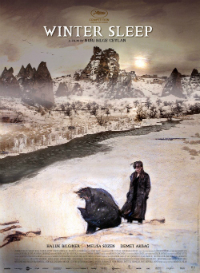Ceylan’s Talky Theatrical Epic unlikely to have Many Nodding Off
 Since it was first announced to go into production more than a year ago, Nuri Bilge Ceylan’s follow-up to his existential and noirish Once a Upon a Time in Anatolia also runs well beyond the three-hour mark, fans of austere and uncompromising cinema rejoiced, for we could feel a swelling sense that Ceylan was approaching a zenith in his artistry and ambition. In truth, it is and it isn’t. A talkathon that may have been derived from a script of 300 pages, Winter Sleep is both Ceylan’s most epic and one of his most intimate films; indeed, it could easily have been conceived as a stage play rather than a film – not least because of the film’s multiple allusions to Shakespeare. Beautiful, exhausting, and at times excessively moralistic, it nonetheless represents a progression in the Turkish auteur’s work, and should propel his reputation past Yilmaz Guney as his country’s greatest filmmaker.
Since it was first announced to go into production more than a year ago, Nuri Bilge Ceylan’s follow-up to his existential and noirish Once a Upon a Time in Anatolia also runs well beyond the three-hour mark, fans of austere and uncompromising cinema rejoiced, for we could feel a swelling sense that Ceylan was approaching a zenith in his artistry and ambition. In truth, it is and it isn’t. A talkathon that may have been derived from a script of 300 pages, Winter Sleep is both Ceylan’s most epic and one of his most intimate films; indeed, it could easily have been conceived as a stage play rather than a film – not least because of the film’s multiple allusions to Shakespeare. Beautiful, exhausting, and at times excessively moralistic, it nonetheless represents a progression in the Turkish auteur’s work, and should propel his reputation past Yilmaz Guney as his country’s greatest filmmaker.
Slow but never boring, the essence of this film is quite simple. In the stunning steppes of the Anatolian region of Cappadocia, Aydin (Haluk Bilginer) lives in and operates Hotel Othello (yeah…), where he shares the space with his wife Nihal (Melisa Sozen), his sister Necla (Demet Akbag), and, at the time the film is set, a couple of Japanese tourists occupying one of the rooms. In its extended opening scene, Aydin is startled while riding in a car with his friend (Ayberk Pekcan) when a young boy, Ilyas (Emirhan Doruktutan), throws a stone at them and cracks the passenger side window. The two men visit Ilyas’s father, Ismail (Nejat Isler), to reprimand the boy and to request they pay to repair the window. In this rather heated meeting, it becomes clear that Aydin is Ismail’s landlord, and there is tension among them revolving around unpaid debts. This sets up the first of the film’s many themes, namely, the presence of class disparity and the indifference of the upper classes.
Other themes opened up in extended conversations include modernization, demonstrated via propositions on how to better advertise the hotel, for example by re-decorating its website; the dialectics between thinking and actions; and, most prominent of all (among many, many others), the suffocating stronghold of hubris and patriarchy. The most drawn-out argument in the film revolves around Nihal’s prolonged efforts to provide a better infrastructure for local schools, which prompts her to set meetings with her committee in her home. Aydin not only finds her preoccupation with this endeavor too insignificant to justify all of her time, but also her efforts to complete the task to be insufficient. He butts in on her meetings, and micromanages her administrative duties, to the point that he effectively mitigates her role in the project that provides her with the only sense of purpose she feels she currently has in life. Meanwhile, Aydin works on his own book project, ‘A History of Turkish Theatre’, and his feuds with Ismail takes complicated ventures into increasingly unethical territory.
Crammed with topical themes by turns sociological, economical, environmental, and ethno-political, Ceylan tries to say so much in this film – which allegedly ran up to two hours longer just before its festival premiere – that he ultimately accomplishes little more crafting a masterful melodrama exercise. The acting and lensing is so across-the-board exceptional that it almost doesn’t matter that none of its bloated material manages to coalesce. In that sense, it couldn’t be further from its self-proclaimed Shakespearean roots; then again, it’s 2014, and it’s refreshing to see such a talented artist at least attempting to break open the molds in which he’s working.
Reviewed on May 20th at the 2014 Cannes Film Festival – Main Competition – 196 Minutes
★★★/☆☆☆☆☆


